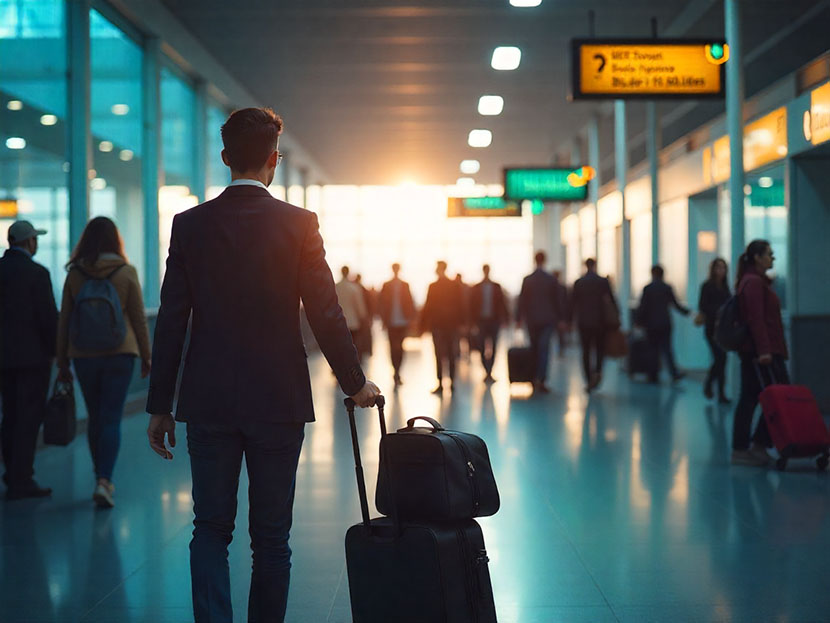Monday, July 21, 2025
As the world adapts to a rapidly changing landscape, the travel industry is being reshaped by a combination of climate change, technological advancements, and airline disruptions. These forces are transforming how we travel, making it both more sustainable and more complex. Climate change has prompted travelers, businesses, and governments to prioritize environmental responsibility, urging the industry to innovate with greener options.
At the same time, technological advancements in AI, biometrics, and digital tools are enhancing the travel experience, streamlining everything from booking to security processes. However, airline disruptions—driven by staff shortages, rising operational costs, and shifting consumer demands—are making air travel more unpredictable, affecting flight schedules, pricing, and customer service. These intertwined challenges and opportunities are changing not just the way we travel, but also how we think about travel. The journey ahead is one of transformation, with sustainability and innovation at its core.
Advertisement
Advertisement
The global travel industry is entering an era of unparalleled transformation. As 2025 approaches, the sector is being heavily influenced by advancements in technology, policy changes, and new consumer behaviors. These shifts are not just future predictions—they are happening now, and their effects will reverberate across the world, changing the way people travel, book accommodations, and navigate the complexities of airports.
The Surge of Sustainability and Green Travel Policies
In an era where climate change concerns are at the forefront, the travel industry has responded with unprecedented green initiatives. Airports, airlines, and hotels are adopting sustainability practices that go beyond just reducing carbon footprints. From more fuel-efficient aircraft to hotel chains promoting energy conservation and waste reduction, sustainability is no longer just a trend—it is an expectation.
Travelers are increasingly demanding that businesses be more accountable for their environmental impact. In fact, reports suggest that 75% of global travelers are willing to pay more for sustainable travel options. This shift is prompting airlines to invest in newer, greener fleets, and airports to enhance their green certification. The focus on sustainability is reshaping not just what companies offer, but also what travelers are willing to support.
Airline Industry Disruptions: New Challenges and Opportunities
The airline industry is experiencing one of its most turbulent periods in recent memory. After recovering from the depths of the pandemic, airlines are facing a variety of challenges, including high fuel costs, staffing shortages, and increased security regulations. Despite these hurdles, airlines are focusing on innovation, including the launch of long-haul, non-stop flights to previously underserved destinations.
In 2025, travelers can expect to see even more changes in the way they fly. Airlines are prioritizing customer service with personalized experiences, and digital advancements like biometric screening and AI-powered customer service are becoming standard at many airports. However, increased demand for travel also means higher prices, and many experts predict that fares may rise as airlines continue to balance costs with the need to remain competitive.
Hotel Innovation: The Rise of Experience-Based Stays
While the airline industry faces obstacles, the hotel sector is booming with innovation. More travelers are seeking unique, experience-driven stays rather than conventional accommodations. Whether it’s staying in an eco-lodge, a luxury tent, or a historic mansion, the demand for more personalized, experiential travel is on the rise.
In 2025, major hotel chains are introducing new loyalty programs focused on offering one-of-a-kind experiences, such as cooking classes with local chefs, private cultural tours, and behind-the-scenes access to local attractions. These moves are part of a broader effort to appeal to the growing demand for immersive travel experiences that go beyond just booking a room for the night.
Additionally, boutique hotels and smaller chains are gaining traction, providing an alternative to the large, cookie-cutter establishments that once dominated the industry. This shift is largely driven by millennials and Gen Z, who prioritize authentic and meaningful experiences over traditional luxury.
Airport and Travel Disruptions: Rising Tensions and Solutions
The return of global travel has brought about serious congestion at major airports. Long lines, flight delays, and overcrowding have created an environment of frustration for travelers. According to data, airport delays are on the rise, with a significant percentage of flights delayed due to staffing shortages and operational inefficiencies.
However, airports worldwide are taking proactive steps to address these issues. From redesigning terminals for better flow to deploying automated systems for baggage handling and security checks, airports are working to enhance passenger experience. While it may take a few years for these solutions to fully take effect, the push for improved infrastructure and smarter technology will reduce wait times and offer smoother travel in the future.
Travel Policies: Major Shifts in International Travel Regulations
One of the most significant trends that will continue into 2025 is the shifting landscape of travel regulations. Countries around the world are increasingly adopting more stringent travel policies in response to both global health concerns and security needs. In particular, digital passports and health verification systems are expected to become commonplace for international travel.
Many governments are also tightening visa requirements, requiring travelers to submit biometric data or undergo additional screening before departure. While these measures may create hurdles in the short term, they aim to improve safety and efficiency across borders.
Moreover, the growing role of data privacy in international travel is another key area of focus. Travel agencies and airlines are adjusting to stricter regulations, ensuring that they comply with the latest standards in data protection and consumer privacy.
Preparing for 2025: What Travelers Need to Know
As we move closer to 2025, travelers must be prepared for a rapidly evolving landscape. From more sustainable travel options to the potential disruptions caused by new policies and technologies, the travel industry is undergoing profound changes that will impact every step of the journey.
For industry professionals, staying ahead of these trends will be crucial. Understanding the pulse of shifting traveler preferences, technological advancements, and geopolitical developments will provide a competitive edge in the highly dynamic world of global tourism. For travelers, embracing these changes and adapting to the evolving travel policies will make for smoother, more rewarding journeys.
In conclusion, 2025 promises to be a year of remarkable change for the global travel industry. With increased sustainability efforts, innovations in airlines and hotels, and major regulatory changes, both businesses and consumers will need to be more agile and forward-thinking than ever before. The world of travel is transforming right before our eyes—are you ready to navigate it?
Advertisement
Tags: 2025 travel trends, airline disruptions, airport disruptions, global travel industry, hotel innovations, international regulations, sustainable travel, travel policy changes, travel technology
Advertisement
Tags: 2025 travel trends, airline disruptions, airport disruptions, global travel industry, hotel innovations, international regulations, sustainable travel, travel policy changes, travel technology
I want to receive travel news and trade event update from Travel And Tour World. I have read Travel And Tour World’sPrivacy Notice.
Monday, July 21, 2025
Monday, July 21, 2025
Monday, July 21, 2025
Monday, July 21, 2025
Monday, July 21, 2025
Monday, July 21, 2025
Monday, July 21, 2025
Monday, July 21, 2025




